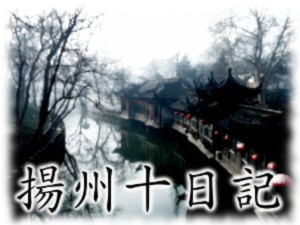揚州十日記 translation: Diary of the Ten Days of Yangzhou, Part 14
This is Part 14 in an annotation of 揚州十日記(‘Diary of the Ten Days of Yangzhou’). Like [吳城日記](http:// eastasiastudent.net/china/classical/wucheng-riji-1/ “吳城日記translation: Diary of Inner City Suzhou, Part 1”), it’s a daily log from the year 1645, a year after the Manchus took Beijing, marking the end of the Ming dynasty and the beginning of the Qing (明末清初).
This diary covers the Yangzhou massacre (also known as “The Ten Days of Yangzhou”), and was written by 王秀楚 (Wang Xiuchu). You can read about these events, as well as see more translations of the text, in Lynn A. Struve’s book Voices from the Ming-Qing Cataclysm.
As always, if you notice a mistake or have any suggestions, please share them in the comments at the end of the page.

自廿五日起,至此已五日,或可冀幸遇赦,乃紛紛傳洗城之說,城中殘黎冒死縋城者大半,舊有官溝壅塞不能通流,至是如坦途,夜行晝伏,以此反罹其鋒。 From the 25th and up to now it had already been five days, and I thought that I might through good fortune be spared, but then one after another there were rumours of an extermination within the city walls; within the city walls, a good half of those who had survived braved death to let themselves down the walls by ropes; the old official moat was blocked up and did not flow, and now it was like a highway; travelling by night and laying low by day, but because of this they also suffered the blade.
城外亡命利城中所有,輒結伴夜入官溝盤詰,搜其金銀,人莫敢誰何。 Outside the city those fleeing death took all their valuables with them, and travelling together at night they were accosted on the official moat by people seeking their gold and silver, and their were none who dared to say anything about it.
予等念既不能越險以逃,而伯兄又為予不忍獨去; We thought we couldn't pass through that hazard and escape, and my second elder brother couldn't bear to escape on his own.
延至平旦,其念遂止; we thought about it until dawn and then put the idea to rest;
原蔽處知不可留,而予婦以孕故屢屢獲全,遂獨以予匿池畔深草中,婦與彭兒裹臥其上,有數卒至,為劫出者再,皆少獻賂而去。 Our original hiding place was known and we couldn't stay there; because my wife was pregnant she had been captured but spared repeatedly; thereupon I hid alone in the deep grass on the banks of a pond, and my wife and our son Peng lay bundled above me; soldiers arrived several times and captured those who came out repeatedly, but each time we paid a small bribe and escaped.
繼一狠卒來,鼠頭鷹眼,其狀甚惡,欲劫予婦; Then a fierce soldier arrived, with a mouse-like head and hawkish eyes; his appearance was extremely vicious, and he wanted to seize my wife;
婦偃蹇以前語告之,不聽,逼使立起,婦旋轉地上,死不肯起,卒舉刀背亂打,血濺衣裳,表裡漬透。 My wife crept forward lamely and spoke to him to tell him her condition, but he didn't listen and forced her to stand up; she rolled to the ground, refusing to stand even if it meant death, and the soldier raised his blade and used the handle to strike her chaotically, the blood splashing onto her clothes, which were soaked through inside and out.
先是婦戒予曰:“倘遇不幸,吾必死,不可以夫婦故乞哀,並累子; Beforehand my wife had exhorted me: "If we meet misfortune, I must die, and you my husband must not plead for me, because then our son would also be dragged into it;
我死則必死子目,俾子亦心死。” if I die then you must cover our son's eyes, otherwise he will die in his heart."
至是予遠躲草中,若為不與者,亦謂婦將死,而卒仍不捨,屢擢婦發週數匝於臂,怒叱橫曳而去。 So now I hid at a distance in the grass as if I wasn't involved; I said to myself that my wife was going to die; the soldier would not give up, repeatedly grabbing my wife's hair and binding it around her arms, angrily cursing her and dragging her off sideways.
由田陌至深巷一箭地,環曲以出大街,行數武必擊數下。 The path in the field went through a deep lane and went out round on to the main street, and as he walked he made sure to strike her several times.
突遇眾騎至,中一人與卒滿語一二,遂舍予婦去。 Suddenly they encountered a group of cavalrymen who arrived, and one of them said one or two sentences to him in Manchu, and there upon he released my wife and left.
始得匍匐而返,大哭一番,身無完膚矣! Only then was she able to crawl back and have a great bout of crying, with not a patch of her skin unbroken!
[← Part 13](/china/classical/yangzhou-shiri-ji-13/” rel="prev “揚州十日記translation: Diary of the Ten Days of Yangzhou, Part 13”) · Part 14 · [Part 15 →](/china/classical/yangzhou-shiri-ji-15/” rel="next “揚州十日記translation: Diary of the Ten Days of Yangzhou, Part 15”)
Sources
Series: Diary of the Ten Days of Yangzhou
- 揚州十日記 translation: Diary of the Ten Days of Yangzhou, Part 1
- 揚州十日記 translation: Diary of the Ten Days of Yangzhou, Part 2
- 揚州十日記 translation: Diary of the Ten Days of Yangzhou, Part 3
- 揚州十日記 translation: Diary of the Ten Days of Yangzhou, Part 4
- 揚州十日記 translation: Diary of the Ten Days of Yangzhou, Part 5
- 揚州十日記 translation: Diary of the Ten Days of Yangzhou, Part 6
- 揚州十日記 translation: Diary of the Ten Days of Yangzhou, Part 7
- 揚州十日記 translation: Diary of the Ten Days of Yangzhou, Part 8
- 揚州十日記 translation: Diary of the Ten Days of Yangzhou, Part 9
- 揚州十日記 translation: Diary of the Ten Days of Yangzhou, Part 10
- 揚州十日記 translation: Diary of the Ten Days of Yangzhou, Part 11
- 揚州十日記 translation: Diary of the Ten Days of Yangzhou, Part 12
- 揚州十日記 translation: Diary of the Ten Days of Yangzhou, Part 13
- 揚州十日記 translation: Diary of the Ten Days of Yangzhou, Part 14 (this article)
- 揚州十日記 translation: Diary of the Ten Days of Yangzhou, Part 15
- 揚州十日記 translation: Diary of the Ten Days of Yangzhou, Part 16
- 揚州十日記 translation: Diary of the Ten Days of Yangzhou, Part 17
- 揚州十日記 translation: Diary of the Ten Days of Yangzhou, Part 18
- 揚州十日記 translation: Diary of the Ten Days of Yangzhou, Part 19
